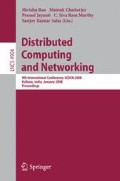Abstract
An important problem in the fault tolerant distributed systems is reaching a consensus among a set of non faulty processes, even in the presence of some corrupted processes. The problem is couched in terms of generals attempting to decide on a common plan of attack. This is in fact the well known Byzantine Generals Problem. We present a consensus protocol of O(ln) communication complexity in asynchronous networks (there is no common global clock and message delivery time is indefinite) with a small error probability where n is the number of players and l is the length of message, given l is sufficiently large, such that l ≥ n 3. This improves the previous result with O(ln 2) communication complexity[5]. Further more, we have proposed a reliable broadcast protocol in asynchronous networks with the assumption that messages delivery time is finite. Both of our protocols can tolerate up to \(t < \frac{n}{3}\) corrupted players and is computationally secure.
Access this chapter
Tax calculation will be finalised at checkout
Purchases are for personal use only
Preview
Unable to display preview. Download preview PDF.
References
Ben-Or, C.M.: Another Advantage of Free Choice: Completely Asynchronous Agreement Protocols. In: PODC 1983. Proc. Second ACM Symp. Principles of Distributed Computing, pp. 27–30 (1983)
Berman, P., Garay, J.A.: Randomized distributed agreement revisited. In: 23th International Symposium on Fault-Tolerant Computing (FTCS-23), pp. 412–413 (1993)
Bracha, G.: An asynchronous [(n − 1)/3]-resilient consensus protocol. In: PODC. Proc. 3rd ACM Symposium on Principles of Distributed Computing, pp. 154–162 (1984)
Cachin, C., Kursawe, K., Petzold, F., Shoup, V.: Secure and efficient asynchronous broadcast protocols (extended abstract). In: Kilian, J. (ed.) CRYPTO 2001. LNCS, vol. 2139, pp. 524–541. Springer, Heidelberg (2001)
Cachin, C., Kursawe, K., Shoup, V.: Random oracles in Constantinople: Practical asynchronous Byzantine agreement using cryptography. Journal of Cryptology 18(3), 219–246 (2005)
Carter, L., Wegman, M.N.: Universal classes of hash functions. Journal of Computing and system sciences (JCSS) 18(4), 143–154 (1979) (Preliminary version appeared in STOC 1977)
Chandra, T.D., Toueg, S.: Unreliable Failure Detectors for Reliable Distributed Systems. J. ACM 43(2), 225–267 (1996)
Desmedt, Y., Kurosawa, K.: A Generalization and a Variant of Two Threshold Cryptosystems Based on Factoring. In: ISC 2007. Proceedings of 10th International Conference, vol. 4779, pp. 351–361. Springer, Heidelberg (2007)
Fischer, C.M.J., Lynch, N., Paterson, M.S.: Impossibility of Distributed Consensus with One Faulty Process. J. ACM 32(2), 374–382 (1985)
Fitzi, M., Hirt, M.: Optimally efficient multi-valued byzantine agreement. In: PODC 2006. Proceedings of the 25th annual ACM symposium on Principles of distributed computing, Denver, Colorado, USA (July 23 - 26, 2006)
Pease, M., Shostak, R., Lamport, L.: Reaching agreement in the presence of faults. Journal of the ACM 27(2), 228–234 (1980)
Rabin, C.M.: Randomized Byzantine Generals. In: FOCS 1983. Proc. 24th IEEE Symp. Foundations of Computer Science, pp. 403–409 (1983)
Ramasamy, C.H.V., Cachin, C.: Parsimonious asynchronous Byzantine-fault-tolerant atomic broadcast. In: Anderson, J.H., Prencipe, G., Wattenhofer, R. (eds.) OPODIS 2005. LNCS, vol. 3974, Springer, Heidelberg (2006)
Shoup, V.: Practical threshold signatures. In: Preneel, B. (ed.) EUROCRYPT 2000. LNCS, vol. 1807, pp. 207–220. Springer, Heidelberg (2000)
Author information
Authors and Affiliations
Editor information
Rights and permissions
Copyright information
© 2007 Springer-Verlag Berlin Heidelberg
About this paper
Cite this paper
Shareef, A., Rangan, C.P. (2007). On Optimal Probabilistic Asynchronous Byzantine Agreement. In: Rao, S., Chatterjee, M., Jayanti, P., Murthy, C.S.R., Saha, S.K. (eds) Distributed Computing and Networking. ICDCN 2008. Lecture Notes in Computer Science, vol 4904. Springer, Berlin, Heidelberg. https://doi.org/10.1007/978-3-540-77444-0_7
Download citation
DOI: https://doi.org/10.1007/978-3-540-77444-0_7
Publisher Name: Springer, Berlin, Heidelberg
Print ISBN: 978-3-540-77443-3
Online ISBN: 978-3-540-77444-0
eBook Packages: Computer ScienceComputer Science (R0)

